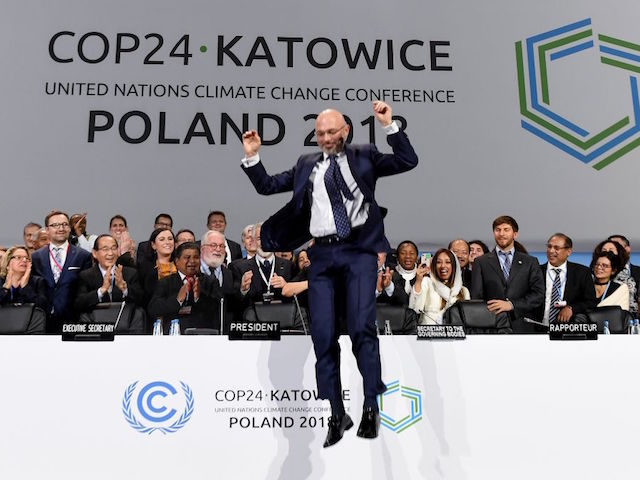The Conference of the Parties (COP24) of the United Nations Framework Convention on Climate Change (UNFCCC) ended on Saturday in Katowice, Poland, with the conference leader leaping over a desk when the nations participating, including the United States, agreed to the so-called Paris Rulebook.
The rulebook, which offers guidelines for measuring efforts to cut greenhouse gas emissions and other protocol to protect the environment outlined in the Paris agreement, neither changes President Donald Trump’s decision to withdraw the United States from the 2015 Paris climate change agreement nor does it require any financial obligation on the part of the U.S.
Judith Garber, principal deputy assistant secretary in the Bureau of Oceans and International Environmental and Scientific Affairs (OES) at the U.S. Department of State, represented the U.S. at the conference and she made clear the Trump administration stance in the statement she issued.
“As President Trump announced last year, the United States intends to withdraw from the Paris Agreement, absent the identification of terms that are more favorable to the American people,” the statement said. “He also made clear that the United States will continue to be a leader in clean energy, innovation, and emissions reduction.“
“Our National Security Strategy declares, ‘The United States will remain a global leader in reducing traditional pollution, as well as greenhouse gases while expanding our economy.’ This achievement, which can serve as a model to other countries, flows from innovation, technology breakthroughs, and energy efficiency gains, not from onerous regulation,” the statement said.
“The global climate conversation needs to embrace not only aspiration but today’s reality,” the statement said. “The U.S. approach incorporates the realities of the global energy mix and uses all energy sources and technologies as cleanly and efficiently as possible, including fossils fuels, nuclear energy, and renewable energy.”
Garber detailed how energy production in the U.S. has thrived under the Trump administration.
“In 2017, the United States exported more advanced energy technology than any other country in the world,” the statement said. “The United States is also the world’s largest oil and gas producer and the second largest producer of renewable energy.”
In a “media note” distributed to the press, the state department drew from Garber’s statement but went farther in explaining that the United States is already doing its part to reduce pollution and would not become involved in any climate change strategy that penalizes Americans financially.
“U.S. energy-related CO2 emissions have fallen by 14 percent since 2005, even as the U.S. economy has grown by 19.4 percent,” the media note said.
“The United States takes note of the negotiated outcome and appreciates the hard work of our negotiators,” the media note said. “The outcome took a significant step toward holding our economic competitors accountable for reporting their emissions in a manner consistent with standards the United States has met since 1992.”
“The United States is not taking on any burdens or financial pledges in support of the Paris Agreement and will not allow climate agreements to be used as a vehicle to redistribute wealth,” the media note said. “We will work with our many partner countries to innovate and deploy a broad array of technologies that promote economic growth, improve energy security, and protect the environment.”
As the Associated Press (AP) reported, the United States cannot officially exit the Paris agreement until 2020, thus it participated in the conference where it refused to endorse UNFCCC’s latest climate change report and held sideline events to promote the benefits of fossil fuels and coal.
AP reported:
Almost 200 nations, including the world’s top greenhouse gas producers, China and the United States, have adopted a set of rules meant to breathe life into the 2015 Paris climate accord by setting out how countries should report their emissions and efforts to reduce them.
But negotiators delayed other key decisions until next year — a move that frustrated environmentalists and countries that wanted more ambitious goals in light of scientists’ warnings that the world must shift sharply away from fossil fuels in the coming decade.
AP also reported that Elliot Diringer of the Center for Climate and Energy Solutions, a Washington think tank, said the U.S. worked hard at the conference for a level playing field.
“When it came to closing potential loopholes that could allow countries to dodge their commitments to cut emissions, ‘the U.S. pushed harder than nearly anyone else for transparency rules that put all countries under the same system, and it largely succeeded,’” Diringer said.
“Under the rulebook, the participating countries shall update their voluntary goals of carbon emission reduction by 2020 with the pledges by the countries reviewed at a U.N. climate summit to be held in September 2019,” the Polish media outlet TVN24 reported.
Follow Penny Starr on Twitter.

COMMENTS
Please let us know if you're having issues with commenting.